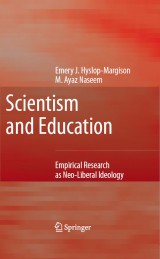Details

Scientism and Education
Empirical Research as Neo-Liberal Ideology|
96,29 € |
|
| Verlag: | Springer |
| Format: | |
| Veröffentl.: | 27.10.2007 |
| ISBN/EAN: | 9781402066788 |
| Sprache: | englisch |
| Anzahl Seiten: | 134 |
Dieses eBook enthält ein Wasserzeichen.
Beschreibungen
We presently live in an era dominated by scientism, an ideology that believes that science (and its rationalist foundation in modern epistemology) has an undeniable primacy over all other ways of seeing and understanding life and the world, including more humanistic, mythical, spiritual, and artistic interpretations. In being critical of scientism as I am, I am not against science per se: modern science and its ways of understanding and knowing the world are valuable, and we should be grateful for them. But it is the hegemony of the habits of mind that manifest pervasively in education that privilege science education, career, and research over other modes and branches of learning and knowing that I have problems with. I have too often witnessed parents overtly or subtly discouraging their children from following artistic or humanistic aspirations and pushing them for training and careers in Science, Math, Business, and Technology. In this society we say in a thousand and one ways that money, security, power, and ultimately fulfillment reside in these disciplines and not in the Arts, Humanities, and Philosophy. We valorize scientists, and even when they speak on subjects outside their domain of expertise, we take their opinions and pronouncements as definitively authoritative. When Science speaks, people listen. This hegemonic attitude towards Science and other subjects that require the exercise of our rational and intellectual faculty is reflected in educational research as well.
Education Research.- Epistemological Problems in Social Science Research.- Empirical Research in Education.- Education Research as Analytic Truths.- Empirical Research as Neo-liberal Ideology.
<P>This volume offers a critical examination of the growing pressure to apply scientific principles as a means to improve education. The authors trace the ideology of scientism to the early faith Auguste Comte placed in science and the scientific method as a panacea to all human problem solving. </P>
<P>By revealing many of the epistemological problems confronted by the social sciences, including education, the authors undermine the prevailing view that a science of education is possible or desirable. Besides revealing the epistemological problems associated with education research, they suggest that the instrumentalism and micro level responsibility related to scientism in education constitute a manipulative ideological smokescreen to distract public attention away from the structural inequities that generate disparate academic outcomes among students in industrialized democracies. The book deals a severe blow to the belief that science is a suitable lens through which to view or strengthen educational practice. </P>
<P></P>
<P>"One begins this book with the skeptical belief that it can’t be right. The task of reading, then, is to locate where Hyslop-Margison goes wrong to reach his radical and disturbing conclusions. At the very least, even the most skeptical will have to recognize that the unsayable—that current educational research has proven largely fruitless for discernable reasons—is certainly plausible. He brilliantly brings an issue that has been considered too eccentric to contemplate into the heart of current educational discourse. Everyone concerned with educational research—researchers and those policy-makers, administrators, and other educational workers who draw on the products of educational research should read this important book carefully."</P>
<P></P>
<P><EM>Kieran Egan, Faculty of Education, Simon Fraser University</EM></P>
<P>By revealing many of the epistemological problems confronted by the social sciences, including education, the authors undermine the prevailing view that a science of education is possible or desirable. Besides revealing the epistemological problems associated with education research, they suggest that the instrumentalism and micro level responsibility related to scientism in education constitute a manipulative ideological smokescreen to distract public attention away from the structural inequities that generate disparate academic outcomes among students in industrialized democracies. The book deals a severe blow to the belief that science is a suitable lens through which to view or strengthen educational practice. </P>
<P></P>
<P>"One begins this book with the skeptical belief that it can’t be right. The task of reading, then, is to locate where Hyslop-Margison goes wrong to reach his radical and disturbing conclusions. At the very least, even the most skeptical will have to recognize that the unsayable—that current educational research has proven largely fruitless for discernable reasons—is certainly plausible. He brilliantly brings an issue that has been considered too eccentric to contemplate into the heart of current educational discourse. Everyone concerned with educational research—researchers and those policy-makers, administrators, and other educational workers who draw on the products of educational research should read this important book carefully."</P>
<P></P>
<P><EM>Kieran Egan, Faculty of Education, Simon Fraser University</EM></P>
An accessible and trenchant critique of current research practice in education Offers an exposé of the ideological reasons behind empirical research in education Proposes alternative practices to strengthen democratic learning practices

















